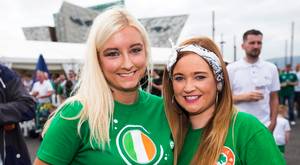Should we stay or leave the European Union?
Published 22/06/2016

On eve of momentous poll, leading figures from both sides of debate put their case ... as Northern Irish football boss joins sporting stars urging a vote to stick with EU
Tom Kelly: 'Claims by Quit camp can't hide fact that NI is better off in Europe'
Six weeks ago when I agreed to Chair the Northern Ireland 'Stronger In' campaign, I felt that the local arguments were clear and self-explanatory.
Firstly, Northern Ireland is a net beneficiary of the EU, 87% of farm incomes come from the EU, one in four jobs are dependent on the EU, more than half of our exports are to the EU, and our peace has been underpinned by EU funding to the tune of more than £2bn.
I had not counted on the series of prolonged and sustained lies, as produced by the Leave campaign, taking root.
But lies are still lies. The big red bus used by the Leave campaign contains two whoppers.
The first is the amount of money we send to the EU. We don't send £350m per week to the EU and the Leave campaign knows it to be untrue.
Secondly it's suggested that Leave campaigners would then inject this non-existent figure into the NHS.
That could be believable if it was not for the fact Leave campaigners like Daniel Hannan don't believe in the NHS - some of them believe it to be a mistake - and others want to privatise it.
Then we had the drummed up scare stories about immigration, brutally introduced to the fringes by Nigel Farage but delivered by silver-tongued Boris Johnson to wider mainstream audiences.
No mention of the 130,000 EU workers in our health and social care system, from consultants to nurses and from GPs to nursing home attendants.
No thought was given to the use of language or to the consequences of giving a nod and a wink to outright xenophobia.
The Leave campaign sold anti-EU settlement with all the persuasiveness of snake oil salesmen and lucky heather pedlars. They might as well have bottled British air and sold it as oxygen to the Brexiteers who stomped about the country making ludicrous claims about bunches of straight bananas and bogeymen from Brussels. Expert opinion, that invariably contradicted them, was continually derided by ideologically-driven Luddites.
Even when logic says one thing, leavers would say the opposite, like the contradiction between securing borders and keeping them open at the same time. Those of us who live in border regions, or those who traded over them before the single market, understand that in the absence of free trade, borders not only exist but are physical, and they were supported by a network of customs clearance operations to help exporters and hauliers complete the complicated paper work.
Leave campaigners have continually sought to confuse the issues of the common travel area with the requirements for trade, and the anomaly of taking control of the borders whilst saying ours would be open.
Earlier, I said that this referendum was as much about ourselves, and the type of society we aspire to be, as it was about the EU.
I am now even more convinced that the back to the future merchants of the Leave campaign have neither a blueprint for moving forward, nor a strategy to heal the societal differences, hatred and fear that have been stoked up within Britain.
Now it is very much about us. We can either be confident, inclusive and together or isolated, divided and insular. I know the future I want for the next generation and it's not one behind borders, barriers - mental or physical between countries or people.
I have seen the benefits of what can be achieved when people work together here and I know of the collective strength to be gained from being part of the EU. Referenda bring passions to the fore - my own included - but the fostering of mainly unrealistic fears about immigration has poisoned this referendum and some in the Leave campaign did little to combat it.
The recent tragic death of fellow Remain campaigner, the late Jo Cox MP, has made us pause for thought and reflect on many things, but in particular her values. It's clear that Jo was a tireless worker for inclusion.
She was a person who cared deeply about the diversity and richness in the make-up of her own constituency. Jo was a passionate advocate for Remain and for the future of the next generation. This referendum is about even more than important issues such as economics, trade and jobs, even more important than borders or sovereignty.
It's about the very soul of our society and the measure of our compassion for each other and others. This referendum is about bringing out the best in our nature, for us, our children and those who live in our communities and within the wide EU family of friends.
Hope not hate is our destiny. Secure it by voting Remain.
- Tom Kelly is chair of the Northern Ireland 'Stronger In' campaign
Kate Hoey MP and Rt Hon Owen Paterson MP: If we vote to remain, we'll have no say in pivotal decisions
It has always been the aim of the European Union to create a United States of Europe, with a single, supranational government in Brussels. This was confirmed by last year's Five Presidents' Report which made clear the intention to move the Eurozone from currency, to fiscal, to economic, to political union by 2025.
If we vote to remain we will be excluded from the key decisions taken by Eurozone members, but we will still be subject to the EU institutions, still outvoted in the Parliament, still outvoted in the European Council, where David Cameron has been defeated 40 times, and still over-ruled by the European Court of Justice.
So, there is no cosy status quo on offer - our future in the EU is one of second-class citizens locked into associate status where we will always be outvoted. We have reached a fork in the road. We should seize this opportunity to leave the EU and re-establish a new relationship with our European neighbours, based on trade and cooperation.
By choosing to leave the political arrangements of the European Union on Thursday, Northern Ireland can have the best of both worlds - a corporation tax rate that puts it on a level playing field with the Republic and also all the benefits of being part of the UK, as the fifth-biggest economy in the world.
Contrary to scare stories, our trade union rights and welfare arrangements, which have been passed by the UK Parliament, will all continue.
By leaving the EU, we will take back full control over all policy, including immigration, farming, and fisheries. We will have full representation on the global regulatory bodies.
Increasingly, regulations are made at global level, and by leaving the EU we can exercise the right to put forward amendments and to vote on key world bodies such as the World Trade Organisation. Working with international allies, we can take a leading role in galvanizing world free trade.
The Common Travel Area (CTA) has worked to our mutual advantage since 1923. Millions of UK and Irish citizens benefit from unrestricted travel between the UK and the Republic every year.
The Irish Parliament's Joint Committee on European Union Affairs published a report in June 2015 that said it should be a key objective to retain the CTA in the event of the UK leaving the EU. It is massively in the interests of the Republic of Ireland and the UK to build on the 2011 commitment to continue their co-operation through the CTA.
With modern technology and electronic passports, many of the practical problems are easily solvable. Today, more than 1,000 trucks will travel from Canada to Detroit, barely slowing down.
Ireland and the UK trade more than €1bn worth of goods and services every week. Ireland and the UK have had a free trade agreement since before joining the EU in 1973, and we will come to a deal again.
According to the Government, if we stay in the EU with free movement, it is forecast that the UK population will increase to 71 million by 2030. A new house will have to be built every six minutes for the next 25 years.
Taking control of our borders would enable the UK Government to ensure a managed supply of skilled labour.
By leaving the structures of the EU, a UK policy could not only pay as much, if not more, than the Common Agricultural Policy, but funds would be allocated in a much more effective and targeted manner.
Policymakers in Belfast and Westminster, with a full understanding of the UK industry, could work together to ensure that farming subsidies are more specifically tailored to satisfy Northern Ireland's unique geography and climate.
Instead of having half the money returned to us with conditions set by Brussels, we will be able to decide exactly how all the millions that we currently send will in future be spent according to our priorities.
Above all, we will win back the ability of the British people to decide who passes laws and raises our taxes. We will be able to re-elect them if they govern wisely and spend taxes sensibly.
Vital areas of Government competence are now in the hands of EU Commissioners who we can neither choose nor dismiss at an election. We have one chance to take control and ensure that we shape our own future. We would urge everyone to grasp this opportunity. Vote Leave on Thursday.
- Kate Hoey is from Belfast and is the Labour MP for Vauxhall. Conservative MP Owen Paterson is a former Secretary of State for Northern Ireland
Related Content
- Vote to leave could cost NI 86,000 jobs, says CBI boss
- May is talking nonsense on border, claims unionist peer
- Boris claim on tariffs draws cheers at EU TV debate
- Europe is deeply flawed, but we'd be lost without it
- Soccer greats Lennon, Rio and Becks queue up to put the boot in Brexit
- Hanna's 'senior moment' tweet blasted by Paisley



































